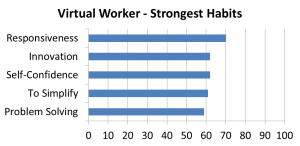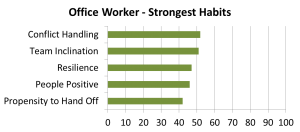My policy for every team I’ve managed has always been “I don’t care where you work, as long as you get your work done!” I have let employees find the work environment that fits them best (and then hounded them relentlessly on performance!). Now Yahoo has taken that option away from their virtual workforce. I can’t argue with why they did it, but I can predict that they are going to lose some of their top performers simply because the habits and behaviors of those individuals won’t match the office environment. Here’s why …
So first of all, a couple of assumptions:
We’re NOT talking about the supposed “freeloaders” that Yahoo is trying to clear out, but we’re really focused on the top performers that are actually contributing
Our definition of a “role” is a combination of the job being performed + the environment it is performed in
Our experience is that when you let top performers choose how to get their job done, they work in a way that matches their ingrained habits and behaviors. That means they pick the environment and work methods that fit them best. Some people loved the collaboration and contact of working in the office, others craved the isolation and independence of the remote environment. In my teams, even though the job was identical, both environments supported outstanding performance in the role.
As a more tangible example, look at two benchmarks that we’ve studied on Virtual & Office Workers.
The first benchmark is the habits of a group of successful individuals that have refused (or specifically chosen) roles in order to be able to work at home. The second benchmark also comprises successful individuals but they have specifically felt the need to be in a corporate workspace, or have been unable to work effectively at home. The five strongest habits (we actually measure nineteen in total) of each group are shown in the following two charts:


Let me tell you what strikes me about these results …
There isn’t a single top 5 habit that is shared between each of the two groups
The Virtual Worker group has stronger patterns of Self-Confidence & Responsiveness, but the top 5 are absent of “people” related habits
The Office Worker group is much stronger in “people” related habits like Conflict Handling and People-Positive
The Office Worker group also has a strong preference for Team Inclination (working in a team) vs. Individual Inclination. Although it’s not one of their top 5, the Virtual Worker group was exactly the opposite
Many times we get the compliment that Shadowmatch is able to “put into concrete” what we only have a “gut feel” about, but can’t articulate or act upon. I’d actually prefer to say we more correctly “put some science to the challenges of managing our wonderful variety!”, but you get the point. What does your gut feel say about these two groups and what would happen if we swapped their working environments?
That brings me back to Yahoo. It’s clear to me that the top performers working from home have settled there because it matches their habits and behaviors best. It’s also clear that a home environment is very different from a work environment. What will happen as they switch to the office? The difference between their ingrained habits and the new environment is going to clash. The employee who had stronger habits of individual inclination is now thrust into a world where they cannot shut the door and work, and now have to sit in a cubicle pod. The employee that lacks the habit of handling conflict may now become stressed by having so much personal interaction around them.
I don’t think it’s wrong to ask people to be in the office; I totally understand why Yahoo is doing this. I even think that they will have some short term success as the employees try and change their behaviors to adapt to this new environment. The problem will come after the effort and stress of trying to modify ingrained habits becomes too much. Unfortunately, I predict (I’ll wager around the 6-9 month mark as behaviors return to the norm) that you’ll find many top performers that can no longer answer the question positively – “Do you Yahoo?”
